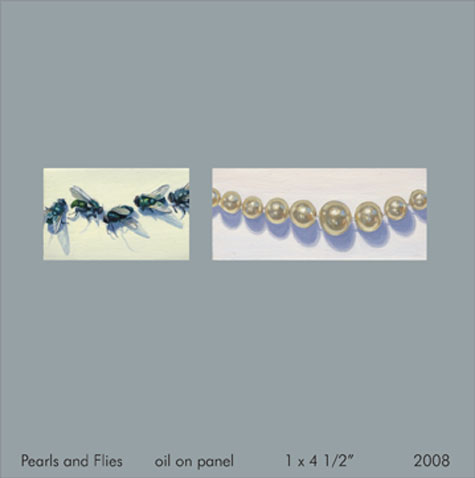
"PEARLS AND FLIES" By Mary Hart, oil on panel, 1 inch by 4.5 inches, 2008. |
Aucocisco has opened its new premises with a show of small paintings by Mary Hart. The new space on Exchange Street is spare and elegant, and so, in their own way, are Hart's little paintings.
The show is a dozen or so assemblages that each consist of two tiny paintings, mounted in the center of a frame that's about the size of a piece of typing paper. The paintings are no more than an inch or two on a side, and the frame around them is colored in a way that suggests old gilding.
Mmounted in pairs that compare similar shapes or structures, they invite the viewer to balance competing, and understated, allusions. Hart suggests meaningful distinctions by making a simple, well-painted image of each object, and has their tiny scale act as a means of directing her viewers' focus on her ideas. She paints with very careful detail, almost in the manner of Dutch still-life painters, that lends a sense of specificity to her presentation.
Take, for instance, "Pearls and Flies." The two panels together are about an inch high and four inches wide. The left panel has five green bottle flies on a white background, realistically rendered at life size or a little less, complete with cast shadows. The right panel shows the central group of a string of pearls, with a larger pearl in the center. They're also about life size, and as you look at them closely you see Hart's illusion of the reflection of the room, with highlights, colors, and shapes.
It's a meditation on what is precious. The color of the flies and their shadows, in the paintings, are as elegant as the pearls, and they are surrounded by the frame that itself seems valuable. The whole assembly is a familiar size that can be held and possessed. The difference between the flies, common household nuisances, and the pearls, rare gems (but a nuisance to the oyster), is one of perception. To a spider, the flies would be infinitely more useful than pearls, but we are people and can thus consider these things in the abstract. Hart wishes us to do so, and provides the means.
A related but distinct comparison is made in "Easter Egg and Flies." This time the two little paintings depict different scales. Together they are just a few inches high, one above the other. The top frame shows a group of green flies with some of their legs fallen off, lying on the white background. The bottom panel holds an green egg-shaped object decorated with zig-zag lines that reflect the flies' disembodied legs. Here the comparison become deeply abstract. The egg is not an egg, and the flies are dismembered and probably dead. The paintings are so small it takes a few moments, and careful looking, to apprehend that we are witnessing a tiny, surreal, and somewhat uncomfortable presentation.
In some paintings the pairing is less charged. In "Amaryllis and Chestnut" we compare similar shapes in different plants. "Ring and Rubber Band" have exactly that, the circle of a ring (valuable) and the circle of a valueless rubber band. "Spool and Shell" compares the Archimedes spiral of a snail shell with the much more complex spiral of a common spool of thread. A jar lid is shown with a sand dollar.
Each of the combinations is an exercise in active knowing. They are so small that to apprehend them at all you are required to make them the only thing in your field of view. They passively await your approach, but actively insist that you must consider each without a thought of whatever else is going on in the room. For a few minutes you are under Hart's direction, thinking about what she wants you to think about. She has your attention.
Ken Greenleaf can be reached at ken.greenleaf@gmail.com.
"LEXICON: DIPTYCH OIL PAINTINGS" | works by Mary Hart | through May 31 | at Aucocisco Gallery, 89 Exchange St, Portland | 207.775.2222